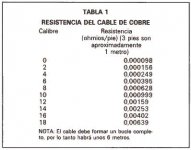So far nobody has been able to prove that they do sound different in a scientifically acceptable test. Science gives us no reason that they should.
Prove it, win money and possibly a Nobel Prize in Physics.
Until then your opinion is just that: A meaningless opinion by an individual.
And what exactly is my opinion, I’m afraid you didn’t get the essence of my posting.
On top of that, nobody in science is just as meaningless as everybody.
Do you know all reports published all over the world on the subject?
Of course not, nobody does, so stop selling gueswork based on your strongly biased opinion.
Hans
Why should anyone waste their time and money on his subjective test procedure when they can do it on their own?Anyone take you up on an offer to visit, and see for themselves?
Did second-order effects make audible difference in objective listening test or it only did in subjective listening test?How was it determined that no other known second-order effects were involved?
Scott, I greatly prefer the sound of my 40W/ch, Mastersound Reference 845, SET amp over active speakers any day, but to each their own I suppose...
Thetubeguy1954
So you have an amp that turns wire into an EQ. To each his own all right.
Are you sure about that? No speaker cable sounds different from any other?So far nobody has been able to prove that they do sound different in a scientifically acceptable test.
Are you sure about that? No speaker cable sounds different from any other?
As I said adequate.
Sure you can make cables sound different by using wire with ludicrously high resistance or capacitance for example, I just wouldn't call them 'adequate'.
The speaker cable I use has 4.5Ω per km which is fine IMO.
There was or is a ridiculously expensive speaker cable which did sound different. It had a little black box at one end and when somebody accidently stepped on it it broke revealing an inductor inside. No wonder that cable gave 'smooth highs' when auditioned.
Last edited:
Oh, so that's just like electrolytic capacitors. However, unlike electrolytic capacitors, there's been no advance in cable design and manufacture, thus the new cables don't last any longer than the old ones. If only these cables had a use in high-density switching power supplies, newer ones would last longer now than the older ones.
You can teach the electrons how to operate in confusion, and also set them free, by playing this song after each "inversion:"
The Temptations - Ball of Confusion - YouTube
😕
I am confused here, I do not know if you have realized that that phrase is part of a response with humor and irony that I attached, and that it does not belong to me, although it was very funny because it "explained" the advantages and disadvantages of buying special "cables" for audio "used.
A capacitor charges and discharges electrons, a cable only carries them, it does not store them. There is no resemblance.
Thanks for the musical theme, it has been a long time since I heard something from that group. But I don't understand English, I'm sorry.
As I said adequate.
Sure you can make cables sound different by using wire with ludicrously high resistance or capacitance for example, I just wouldn't call them 'adequate'.
Or with inadequate amps with high output impedance or instability.
...................
*Small values of R can be tricky to measure, of course. But you do the best you can and estimate from wire resistance tables...............
You read that in my post 1407, what a disappointment, you are not a know-it-all and you plagiarize me ......
But if you recommend a good instrument to accurately measure the resistance of my cables, I will excuse you ... ( Fluke? ) 😀
Attachments
Last edited:
No problem, I was trying to be funny as well ... and yes, there are lots of good temptations ... songs.😕
I am confused here, I do not know if you have realized that that phrase is part of a response with humor and irony that I attached, and that it does not belong to me, although it was very funny because it "explained" the advantages and disadvantages of buying special "cables" for audio "used.
A capacitor charges and discharges electrons, a cable only carries them, it does not store them. There is no resemblance.
Thanks for the musical theme, it has been a long time since I heard something from that group. But I don't understand English, I'm sorry.
Sorry, where did you say that? Must have been in a different post - I didn't see it.As I said adequate.
In the past they used capitals for Naim?
Not sure you can be wrong with this one. Here's three ways in one screenshot.
Attachments
It's like a colour or a taste, some like it and others don't
When you mean to hear a positive difference between cables high enough to make you decide to buy this cable, just do it.
Be happy with it, whether cheap or expensive, but don't try to convince others that this is the best cable (or colour or taste for that matter).
When in your opinion all cables are sounding the same, be aware that this is just an opinion and not a fact.
Opinions may be nice to read as long as they are not presented as hard facts, causing many negative postings in this thread and very little constructive contributions.
Hans
Excellent post and I wholeheartedly agree. Thank you Hans.
Probably should have tried a Hafler but never did. They generally sound nice but don't know how stable they are into a funky load. I like the old Crown amps for their bullet proof nature, but have had nothing but trouble with many of the newer ones.
Yeah, there's nothing quite like a Macrotech.
I have one of their newer ones (MA12000i) and find that one worthy of the name. At the price, though, you'd certainly hope so.
Chris
P.A. amps are crazy now, so much built in computer power, touch screens, DSP, DANTE, networking, etc. We had some that ran XP embedded and we could play solitaire on them! LOL.
A few months ago I detailed to Amirm what to test for with the Isolda cable.
Oddly, no results have been provided. I am not sure if the cables were delivered.
I pointed out the concern with IMD vs cable RF impedance
Should anyone wish details...
jn
Oddly, no results have been provided. I am not sure if the cables were delivered.
I pointed out the concern with IMD vs cable RF impedance
Should anyone wish details...
jn
No. Low.
I detailed to amirm how RFZ can interact with the speaker to alter the resultant IMD spectra. I asked him to test this possibility.
Jn
I detailed to amirm how RFZ can interact with the speaker to alter the resultant IMD spectra. I asked him to test this possibility.
Jn
Do you apply the same view on other audio electronics such as DAC?Excellent post and I wholeheartedly agree.
- Status
- Not open for further replies.
- Home
- General Interest
- Everything Else
- speaker cable myths and facts


